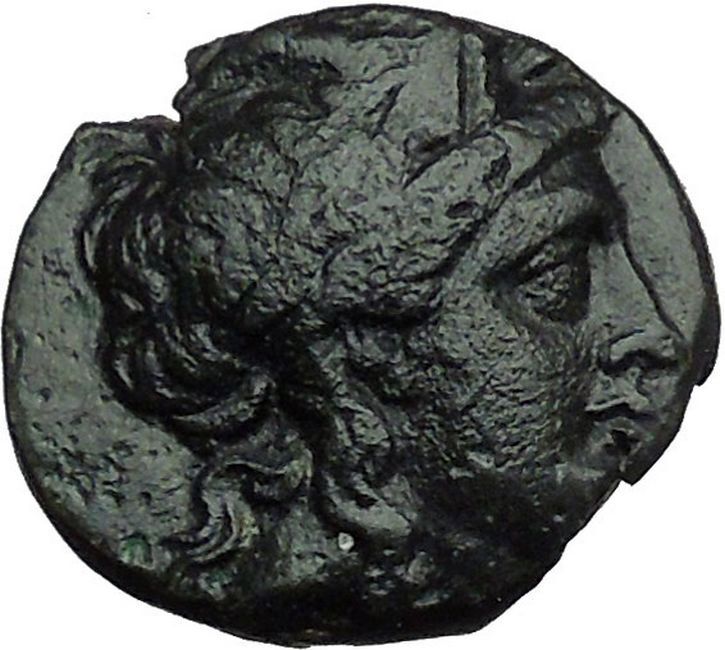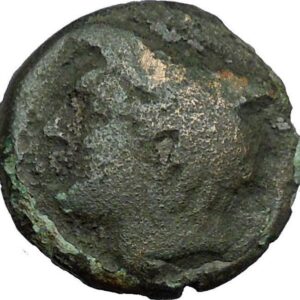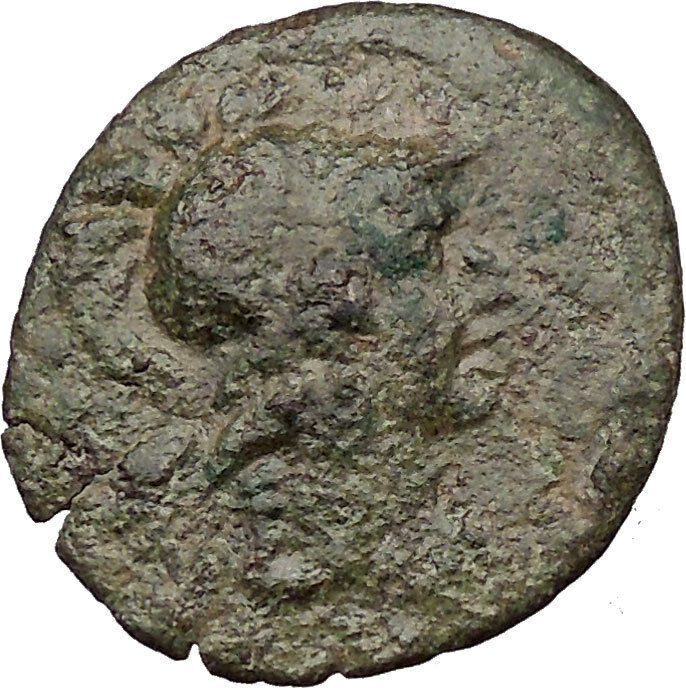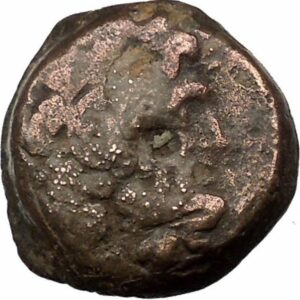|
Greek Coin of Seleukid Kingdom
Seleukos IV, Philopator – King: 187-175 B.C.
QUEEN LAODIKE IV PORTRAIT TYPE
Serrated Bronze 14mm (2.85 grams) Antioch on the Orontes mint
Reference: SC 1407; HGC 9, 686
Veiled and draped bust of Laodike IV right.
ΒΑΣΙΛΕΩΣ ANTIOXOY, Head of elephant left; tripod in field to right.
Laodike IV was the daughter of Antiochos IV Herakleides. Seleukos IV was her 2nd husband.
The kingdom bequeathed by Antiochos the Great to his son, Seleukos IV, was very different from the one which he himself had ruled just a few years before. Asia minor was lost to the kings of Pergamon, the eastern provinces of Parthia and Baktria were not firmly established as independent kingdoms, and in addition Seleukos had to pay a heavy annual war-indemnity to the Romans. What was left to the Seleukid realm he seems to have governed wisely and well until 175 B.C. when he was murdered by his minister Heliodoros.
You are bidding on the exact item pictured, provided with a Certificate of Authenticity and Lifetime Guarantee of Authenticity.
Laodice IV (flourished second half 3rd century BC and first half 2nd century BC) was a Greek Princess, Head Priestess and Queen of the Seleucid Empire. Antiochus III appointed Laodice in 193 BC, as the chief priestess of the state cult dedicated to her late mother Laodice III in Media. She later was married to three Kings of the Seleucid Empire, all her brothers.
Laodice was of Greek Macedonian and Persian descent. She was one of the daughters and among the children born to the Seleucid Monarchs Antiochus III the Great and Laodice III. Her paternal grandparents were the former Seleucid Monarchs Seleucus II Callinicus and Laodice II, while her maternal grandparents were King Mithridates II of Pontus and his wife Laodice.
The parents of Laodice IV were first cousins, because her paternal grandfather and her maternal grandmother were brother and sister, and were among the children of Antiochus II Theos and Laodice I. She was born and raised in the Seleucid Empire. Laodice was commemorated with an honorific inscription dedicated to her at Delos.
In 196 BC, her eldest brother, crown prince Antiochus, was appointed by her father to succeed him. In that year Laodice was married to him. The marriage of Laodice IV and Antiochus was the first sibling marriage to occur in the Seleucid dynasty. From their sibling union Laodice IV bore Antiochus a daughter called Nysa. Antiochus III appointed Laodice in 193 BC as the chief priestess of the state cult dedicated to her late mother Laodice III in Media. Later that year, her brother-husband died. The family, particularly Antiochus III, grieved his death.
Antiochus III arranged for her to marry again, this time to her second eldest brother Seleucus IV Philopator. In their union, they had three children: two sons, Antiochus and Demetrius I Soter, and a daughter named Laodice V. In 187 BC, Antiochus III died and Seleucus IV succeeded their father. He became the Seleucid King while Laodice IV became the Seleucid Queen. They reigned as the Seleucid imperial couple from 187 BC until 175 BC, when Seleucus IV died. There is no surviving record on how Laodice IV reigned as queen or how her contemporaries viewed her. Briefly in 175 BC, Laodice’s first son was King. There are surviving coins dating from 175 BC that show portraits of Laodice IV and her first son with Seleucus IV, Antiochus, making them the first Seleucid King and Queen depicted on coins.
After the death of Seleucus IV, Laodice married for the third time her youngest brother Antiochus IV Epiphanes, who succeeded his second eldest brother as King. Antiochus IV co-ruled with his nephew Antiochus and adopted him as his son, but had him assassinated in 170 BC. Laodice bore Antiochus IV two children: a son, Antiochus V Eupator, and a daughter, Laodice VI. When Laodice’s youngest brother and first son co-ruled, her second son Demetrius I Soter was sent as a political hostage to Rome. When Antiochus IV died, the first son of Laodice IV and Antiochus IV, Antiochus V Eupator succeeded his father as Seleucid King.
 Seleucus IV Philopator (Greek: Σέλευκος Δ΄ Φιλοπάτωρ; c. 218 – 175 BC), ruler of the Hellenistic Seleucid Empire, reigned from 187 BC to 175 BC. He was the second son and successor of Antiochus III the Great and Laodice III. Seleucus IV wed his sister Laodice IV, by whom he had three children: two sons Antiochus, Demetrius I Soter and a daughter Laodice V. Seleucus IV Philopator (Greek: Σέλευκος Δ΄ Φιλοπάτωρ; c. 218 – 175 BC), ruler of the Hellenistic Seleucid Empire, reigned from 187 BC to 175 BC. He was the second son and successor of Antiochus III the Great and Laodice III. Seleucus IV wed his sister Laodice IV, by whom he had three children: two sons Antiochus, Demetrius I Soter and a daughter Laodice V.
He was compelled by financial necessities, created in part by the heavy war-indemnity exacted by Rome, to pursue an ambitious policy. In an effort to collect money to pay the Romans, he sent his minister Heliodorus to Jerusalem to seize the Jewish temple treasury.
The Bible tells of a prophecy given by a messenger angel in Daniel 11:20 (NLT). The text states that Seleucus “will be remembered as the king who sent a tax collector to maintain the royal splendor.” The deuterocanonical lends more to this in 2 Maccabees 3:2-3… “It came to pass that even the kings themselves, and the princes esteemed the place in Jerusalem] worthy of the highest honour, and glorified the temple with very great gifts: So that Seleucus king of Asia allowed out of his revenues all the charges belonging to the ministry of the sacrifices.”
On his return from Jerusalem, Heliodorus assassinated Seleucus, and seized the throne for himself. The true heir Demetrius, son of Seleucus, was now being retained in Rome as a hostage, and the kingdom was seized by the younger brother of Seleucus, Antiochus IV Epiphanes. Antiochus managed to oust Heliodorus and an infant son of Seleucus, also named Antiochus, was formal head of state for a few years until Epiphanes had him murdered.
 The Seleucid Empire was a Hellenistic state ruled by the Seleucid dynasty founded by Seleucus I Nicator following the division of the empire created by Alexander the Great. Seleucus received Babylonia and, from there, expanded his dominions to include much of Alexander’s near eastern territories. The Seleucid Empire was a Hellenistic state ruled by the Seleucid dynasty founded by Seleucus I Nicator following the division of the empire created by Alexander the Great. Seleucus received Babylonia and, from there, expanded his dominions to include much of Alexander’s near eastern territories.
The Seleucid Empire was a major center of Hellenistic culture that maintained the preeminence of Greek customs where a Greek-Macedonian political elite dominated, mostly in the urban areas. The Greek population of the cities who formed the dominant elite were reinforced by emigration from Greece. Seleucid expansion into Anatolia and Greece was abruptly halted after decisive defeats at the hands of the Roman army. Their attempts to defeat their old enemy Ptolemaic Egypt were frustrated by Roman demands. Much of the eastern part of the empire was conquered by the Parthians under Mithridates I of Parthia in the mid-2nd century BC, yet the Seleucid kings continued to rule a rump state from the Seleukid Kingdom until the invasion by Armenian king Tigranes the Great and their ultimate overthrow by the Roman general Pompey.
|





 Seleucus IV Philopator (Greek: Σέλευκος Δ΄ Φιλοπάτωρ; c. 218 – 175 BC), ruler of the Hellenistic Seleucid Empire, reigned from 187 BC to 175 BC. He was the second son and successor of Antiochus III the Great and Laodice III. Seleucus IV wed his sister Laodice IV, by whom he had three children: two sons Antiochus, Demetrius I Soter and a daughter Laodice V.
Seleucus IV Philopator (Greek: Σέλευκος Δ΄ Φιλοπάτωρ; c. 218 – 175 BC), ruler of the Hellenistic Seleucid Empire, reigned from 187 BC to 175 BC. He was the second son and successor of Antiochus III the Great and Laodice III. Seleucus IV wed his sister Laodice IV, by whom he had three children: two sons Antiochus, Demetrius I Soter and a daughter Laodice V. The Seleucid Empire was a Hellenistic state ruled by the Seleucid dynasty founded by Seleucus I Nicator following the division of the empire created by Alexander the Great. Seleucus received Babylonia and, from there, expanded his dominions to include much of Alexander’s near eastern territories.
The Seleucid Empire was a Hellenistic state ruled by the Seleucid dynasty founded by Seleucus I Nicator following the division of the empire created by Alexander the Great. Seleucus received Babylonia and, from there, expanded his dominions to include much of Alexander’s near eastern territories.




